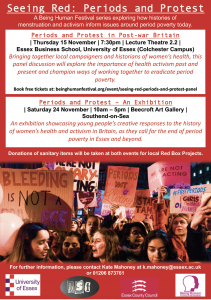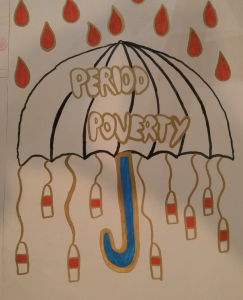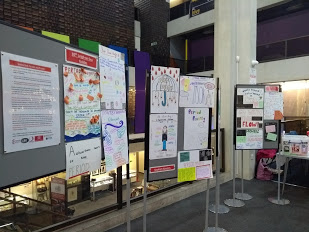Since November 2018, the Body, Self and Family project has been hosting numerous public engagement events as part of the series ‘Seeing Red: Periods and Protest’. Initially launched in conjunction with the 2018 Being Human Festival, ‘Seeing Red’ draws on women’s experiences of menstruation and activism in post-war Britain to consider why period poverty remains an issue today.
Statistics published by Plan International in 2017 highlight the fact that one in ten girls in Britain are unable to afford sanitary items, twelve percent of girls have had to improvise sanitary wear due to affordability issues, using socks and tissues instead, and one in five girls have changed to a less suitable menstrual products due to their cost. Girls who cannot afford sanitary items often feel unable to go to school when they are on their period. They therefore miss lessons and feeling less confident in their academic abilities. Recent cuts to state support, diminishing wages and increased living costs have meant that period poverty has become increasingly prominent. Foodbanks have reported that more and more women have started using them to access sanitary pads and tampons.
In recent years, campaigning around period poverty has become more visible. Campaigns and initiatives including #FreePeriods, the Red Box Project and Bloody Good Period are currently doing incredible work to raise awareness and donate sanitary items to those who need them most. Period poverty, however, is not a new issue. For years, women have described being unable to afford sanitary items, attributing their expense, in part, to their taxation as a luxury item. As historians, we are keen to understand why period poverty has only recently become an issue subject to public discussion. When compiling statistics around period poverty, Plan International also recorded girls’ broader attitudes towards menstruation. They found that nearly half of girls aged between 14 and 21 in Britain are embarrassed by their periods. Through ‘Seeing Red’, we want to highlight how feelings such as embarrassment and shame are closely related to the history of menstruation.

Body, Self and Family has explored how the shame and embarrassment associated with periods can be historically situated through a series of different events. On November 15 2018, ‘Seeing Red’ was launched with the panel discussion ‘Periods and Protest in Post-war Britain’ at the University of Essex (Colchester Campus). The event brought together campaigners, activists and historians to consider the importance of health activism past and present and champion ways of working together to eradicate period poverty. Speakers included historian Dr Tracey Loughran, who drew on rarely-used archival sources and new oral history interviews to consider women and girls’ experiences of menstruation across the twentieth century. Tracey argued that we need to know what women and girls have thought and felt to understand why it can be so difficult to change entrenched attitudes around periods, therefore emphasising why activism in this field is so important. Activist, educator and Mighty Grrl Movement-founder Lauren Mittell spoke passionately of the need to empower children and young people to express their views and campaign for social change. Lauren runs female empowerment groups for girls aged 9-11 which build self-esteem, teach women’s history and fundraise. Chella Quint, founder of #periodpositive – a campaign promoting menstrual education in schools – highlighted how myths surrounding periods continue to be promoted in society today. The event reinforced the value of working with young people when campaigning against period poverty, drawing on their voices and experiences to consider how historical representations of menstruation continue to influence their everyday lives.

Here at the Body, Self and Family project, we have also aimed to empower girls to use their experiences to call for an end to period poverty and understand that periods are nothing to be ashamed of. We have done so by hosting numerous ‘Seeing Red’ workshops at local schools and Girlguiding groups across Colchester and Southend-on-Sea. Through the workshops, we have invited over one hundred girls aged from 10-16 to examine historical sources relating to periods, including advertisements for menstrual products in magazines and extracts from our Body, Self and Family oral history interviews. The participants are then asked to draw on these sources to produce posters that raise awareness about period poverty. The workshops have simultaneously served as a forum where girls can share their experiences in a supportive environment. What has been striking is how these experiences so clearly demonstrate the endurance of concerns surrounding periods, past and present. Girls continue to worry about what will happen if their periods start at school and they do not have any sanitary items, or if boys end up finding out about them. The workshops have also illustrated, however, how young women and girls support one another, making sure that their friends have sanitary items when they need them and talking to each other about how they feel.

We have been blown away by the creativity displayed in the posters produced by our workshop participants, many of which were displayed at a Seeing Red exhibition at the Beecroft Art Gallery, Southend-on-Sea on 24 November 2018. The exhibition encouraged intergenerational discussion about periods, with many of the women who visited sharing their own reflections and recollections. The exhibition resulted in the Beecroft Art Gallery setting up a Red Box Project donation point, ensuring that they now collect menstrual products for girls in Southend who cannot afford them. ‘Seeing Red: Periods and Protest’ has reiterated the significant role that history can play in inspiring activism and social change in the present day. The event series has also emphasised the importance of recognising young people’s voices when seeking to instigate change, an invaluable lesson that we will continue to endorse as the project’s public engagement work progresses.
- Kate Mahoney, April 2019

